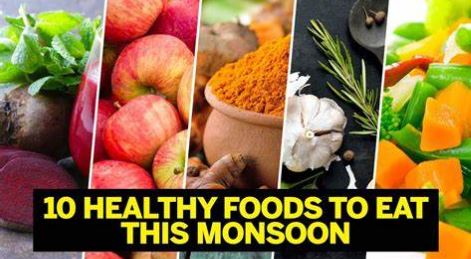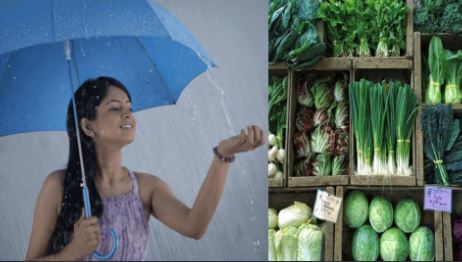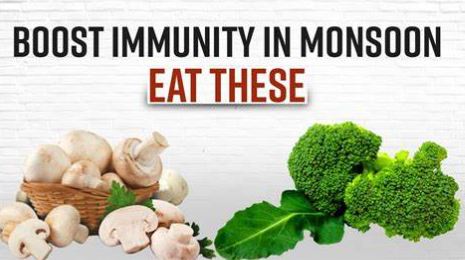
Monsoon Diet during monsoon :-
According to Ayurveda, during the Visarga period, i.e., when the south direction of the sun begins, i.e. during the monsoon season, Vata dosha increases in the body and this increased Vata dosha causes diseases by polluting Pitta and Kapha doshas, hence the risk of diseases increases with the onset of the monsoon season. To stay healthy during this season, it is necessary to make necessary changes in lifestyle. Also, digestion decreases during this period. Diseases increase due to low immunity and increased infection in the environment. Due to this, our immune system weakens. This is why we need to be careful about what we eat and drink in Monsoon.
*During the monsoon season, since digestion is slow, food is not digested properly, so eat light, fresh, hot food that is easy to digest, eat boiled, steamed and roasted food. Avoid raw, fried and fermented foods.
*To strengthen our immune system during the monsoon season, include foods rich in vitamin C in our diet. Sneezing, cough, diarrhea and stomach infections are most common during this season. Some people also get fever. To avoid this, eat a nutritious diet. Drink more water and keep yourself hydrated. For this, take amla, lemon water, coconut water and aloe vera juice in Monsoon.
*It is very important to take care of hygiene during this season. Before using fruits and vegetables, wash them with salt in warm water. Do not eat food that has been kept for more than three hours. Banana, papaya, fresh juice will come in handy. Avoid eating street food and packaged goods, and wash your hands frequently.
*Avoid heavy meals. Eat light, fresh and digestible food.
*Drink a glass of warm water with lemon in the morning
*You can include cereals, lentils, curd, mung bean dal thalipeeth or fruit chaat in breakfast. Avoid oily food in breakfast in Monsoon.
*Have chapati, ghee, vegetables, curd, salad in lunch. Foods containing fiber, protein, nutrients, carbohydrates and vitamins should be included in the diet. Garlic chutney should be included. Add ginger, cumin, a pinch of pepper to buttermilk and drink it in the afternoon.
- Eat dinner early, if possible. This makes digestion easier.
Always eat light and easily digestible things for dinner. You can eat khichdi, lentils and curd for dinner in Monsoon.
*Before using fruits and vegetables, clean them with salt in warm water. Do not eat food that has been kept for more than three hours.
*Grains like jowari, barley, rachani, wheat etc. should be eaten with ghee.
Vegetables like dudhi, shirali, ghosali, padwal, kohlala should be included in the diet. Grains like gram, pea, gram, pavta, rajma etc. should not be used. Moong and small amounts of matki, masoor, kulith etc. are easily digested without increasing vata in the body in Monsoon
*Roast a small piece of ginger on a pan and cool it. Now add a little salt to this piece and eat it five minutes before meals. This increases appetite and keeps digestion going.
*Do not drink cold water. Drink boiled and cooled or lukewarm water throughout the day. Also, drink water with basil leaves and alum added.
*Green leafy vegetables: Consuming green leafy vegetables during the month of Shravan increases the problem of vata. Not only this, bacteria and insects also grow in these vegetables, which can cause stomach ache and other complaints, so they should not be eaten in excess. Also, eggplant increases vata, so they should not be eaten.
*, Fish: If you consume this during this period, the condition of the body also worsens. Stomach problems arise, indigestion occurs,
The rainy season is the breeding season for fish. Therefore, the risk of infection is higher at this time, so eating them should be avoided.
- Milk, curd: People with digestive complaints should also avoid consuming milk and curd during this season because there is a possibility of cold, cough and throat related diseases.
Drinking milk can increase the chances of gas and stomach diseases in Monsoon.

पावसाळ्यात आहार :-
आयुर्वेदानुसार विसर्ग काळात म्हणजे सुर्याचे दक्षिणायन सुरु झाल्यावर म्हणजेच पावसाळ्यात शरीरात वात दोष शरीरात बळावतो व हा वाढलेला वातदोषाच पित्त व कफ दोषांना दुषीत करून आजाराची निर्मिती करत असतो त्यामुळे पावसाळा सुरू झाल्यावर आजारांचा धोका वाढतो. या ऋतूत निरोगी राहण्यासाठी जीवनशैलीत आवश्यक बदल करणे गरजेचे आहे. तसंच या काळात पचन शक्ती कमी होते. प्रतिकार शक्ती कमी आणि वातावरणातील जंतुसंसर्ग वाढल्याने आजार वाढतात. त्यामुळे आपली रोगप्रतिकारक शक्ती कमकुवत होते. यामुळेच खाण्यापिण्याबाबत काळजी घेण्याची गरज आहे.
*पावसाळ्यात पचनक्रिया मंद असल्याने अन्नपचन योग्य होत नाही यासाठी पचायला हलका ताजा गरम आहार घ्यावा, उकडलेले, उकळलेले आणि भाजलेले अन्न खावे. कच्चे, तळलेले आणि आंबवलेले पदार्थ टाळावेत.
*पावसाळ्यात आपली रोगप्रतिकारक शक्ती मजबूत करण्यासाठी व्हिटॅमिन सीयुक्त पदार्थांचा आहारात समावेश करावा. या ऋतूमध्ये शिंका येणे, खोकला, जुलाब आणि पोटात संसर्गाची प्रकरणे सर्वाधिक आढळतात. काहींना तापही येतो. हे टाळण्यासाठी पोषक तत्वांनी युक्त आहार घ्यावा. अधिकाधिक पाणी प्यावे आणि स्वतःला हायड्रेट ठेवावे. यासाठी आवळा, लिंबूपाणी, नारळपाणी आणि कोरफडीचा रस घ्यावा.
*या ऋतूत स्वच्छतेची काळजी घेणे खूप गरजेचे आहे. फळे आणि भाज्या वापरण्यापूर्वी, कोमट पाण्यात मीठ घालून स्वच्छ करा. तीन तासांपेक्षा जास्त काळ ठेवलेले अन्न खाऊ नये. केळी, पपई, ताजा रस यांचे सेवन येईल. रस्त्यावरील खाद्यपदार्थ आणि पॅकबंद वस्तू खाणे टाळा, तसेच हात वारंवार चांगले धुवा.
*जड जेवण टाळावे. हल्के, ताजे आणि पचनास योग्य असाच आहार घ्यावा.
*सकाळी ग्लासभर कोमट पाणी लिंबू पिळून प्यावं
*न्याहारीमध्ये तृणधान्ये, डाळ, दही, मुगाच्या डाळीचे थालीपीठ किंवा फ्रूट चाट यांचा समावेश करू शकता. नाश्त्यात तेलकट खाणे टाळावे.
*दुपारच्या जेवणात चपाती,तूप, भाज्या, दही, कोशिंबीर घ्या. फायबर, प्रथिने, पोषक तत्वे, कार्बोहायड्रेट्स आणि जीवनसत्त्वे असलेल्या पदार्थांचा आहारात समावेश करावा.लसूण चटणीचा समावेश असावा.ताकात सुंठ, जिरं, चिमूटभर मिरी घालून दुपारी प्यावं.
- शक्यतो रात्रीच जेवण लवकर जेवावे. त्यामुळे पचन सुलभपणे होते.
रात्रीच्या जेवणात नेहमी हलक्या आणि सहज पचणाऱ्या गोष्टी खाव्यात. रात्रीच्या जेवणात तुम्ही खिचडी, डाळ आणि दही खाऊ शकता.
*फळे आणि भाज्या वापरण्यापूर्वी, कोमट पाण्यात मीठ घालून स्वच्छ करा. तीन तासांपेक्षा जास्त काळ ठेवलेले अन्न खाऊ नये.
*ज्वारी, जव , नाचणी, गहू इ. धान्यांची भाकरी किंवा चपाती तुपाबरोबर घ्यावी.
दुधी, शिराळी, घोसाळी, पडवळ, कोहळा अशा वेलभाज्यांचा आहारात समावेश असावा.चणा, वाटाणा, हरभरा, पावटा, राजमा इ. कडधान्यांचा वापर करू नये. मूग तसंच कमी प्रमाणात मटकी, मसूर, कुळीथ इ. कडधान्ये शरीरातील वात न वाढवता सहज पचतात
*आल्याचा छोटा तुकडा तव्यावर भाजून थंड करा. आता या तुकड्यात थोडेसे सैंधव मीठ घाला आणि जेवणाच्या पाच मिनिटे आधी खा. त्यामुळे भूक वाढते आणि पचनक्रिया बरोबर राहते.
*थंड पाणी पिऊ नये. दिवसभर उकळवून गार झालेलं किंवा कोमटच पाणी प्यावं. तसंच तुळशीपत्र टाकलेलं आणि तुरटी फिरवलेलं पाणी प्यावं.
*हिरव्या पालेभाज्या: श्रावण महिन्यात हिरव्या पालेभाज्यांचे सेवन केल्यास वात होण्याचा त्रास वाढतो. एवढेच नाही तर या भाज्यांमध्ये बॅक्टेरिया आणि कीटक देखील वाढतात, ज्यामुळे पोटदुखी आणि इतर तक्रारी होऊ शकतात त्यामुळे त्या जास्त खाऊच नयेत.तसेच वांगी ही वात वाढवतात त्यामुळे खाऊ नयेत.
*,मास मासेः या काळात हे सेवन केल्यासशरीराची स्थिती देखील खराब होते.पोटाच्या समस्या जन्म घेतात, पचनविकृती येते,
पावसाळ्यामध्ये माशांच्या प्रजननाची वेळ असते. म्हणून, यावेळी संसर्गाचा धोका अधिक असतो, म्हणूनच त्यांना खाणे टाळले पाहिजे.
- दूध,दहीःपचनाची तक्रार असलेल्या मंडळी नी या हंगामात दूध ,दहीचेसेवन करणे देखील टाळले पाहिजे कारण सर्दी, खोकला आणि घशासंबंधी आजार होण्याची शक्यता असते.
दूध पिण्यामुळे गॅस आणि पोटाच्या आजाराची शक्यता जास्त होऊ शकते.

